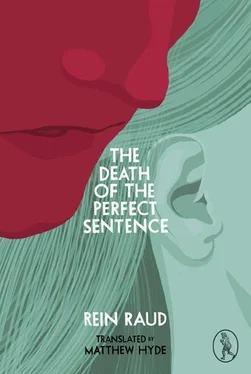You have to find someone who no one could ever, ever, link with you and your group, Valev had said. But in whom you can place absolute trust. That means less risk for that person, and more importantly, less risk for our cause. If it’s a schoolmate, relative, work brigade member, and they end up getting caught for some reason, then even if they keep their lips sealed you will have the security services at your door in half an hour flat.
It’s easy for him to talk, Raim thought, but just try telling this girl that she now has to go and put everything on the line in the name of Estonian independence.
“What’s up?” Maarja asked, and she laughed her ringing laugh. “You’ve got an expression on your face like you’re about to make me a marriage proposal.”
“So you get them often then?” Raim asked, and he laughed too.
“Well at least a couple of times a week,” Maarja replied trying to keep a straight face, but not succeeding particularly well.
When Alex got to work in the morning Konstantin Zakharovich gave him a slightly odd look before informing him that Gennady Vassilyevich was waiting for him in his office. Which meant he had to go and see him right away. Gennady Vassilyevich started by inquiring, with contrived joviality, how Alex was, and then told him that he would have to drop by the city administration, since the mayor’s foreign affairs advisor, one Vladimir Vladimirovich, apparently wanted to see him.
Even after I put the final full stop in the draft of this story, it took me a long time to shake the moods which it evoked in me. It was hard to think of anything else. The story itself has changed quite a lot in the meantime, but the most important details have stayed the same. And I still feel that I am somehow trapped inside it. Although I am simultaneously unburdened of the parts of myself which I left there, and I feel that I can now write what I want – or even nothing at all.
The first time I saw it was in a dream. Or at least, part of it, Maarja and Alex’s story, which we will get to soon. It was just like a film, in fact it really was a film which I was watching while I slept. But it took place in Poland. The café where they met was right inside the art museum there, not like the café in Kadriorg. But the museum was just like our one. I still remember the chinking of Maarja’s spoon against the plate as she ate her cake. So some memories never fade. It was summer in my dream and in real life, the sun was scorching hot and I could hear the gentle murmur of the sea.
Without fully realising why, Alex sensed that this couldn’t mean anything good, since good news would normally just land on your desk in the course of other business, for no apparent reason. Good news was not something which you as an individual, specifically you, whoever you happened to be, would have earned, and where your role would have to be specifically emphasised. No, good news just happened by chance, since the reasons why the system might suddenly smile upon you would be random and unknowable, and had to remain that way. Bad news was something altogether different. It could involve you having to personally account for some misfortune which you had no way at all of preventing. Like, for example, when the father of one of Alex’s classmates oversaw the building of a children’s home which then burnt down, and this happened to be the same children’s home which the second secretary of the Communist Party’s regional office had personally opened on TV. It burnt down because the building brigade foreman had used up all the insulation materials which met the required fire safety standards to build a country cottage for his direct superior, the deputy director of the trust. But the system reacted swiftly and mercilessly against the father of Alex’s classmate, because it was his signature which was on the documentation signing off the building for use, there for everyone to see. Rights and responsibilities are not in fact equally balanced. You can easily end up being responsible without having any rights at all.
In other words, if Vladimir Vladimirovich wanted to see Alex personally, it couldn’t mean good news. In the world of good news, Alex simply did not exist for Vladimir Vladimirovich.
The Smolny Institute was originally established at some point in the beginning of the nineteenth century for the education of aristocratic young ladies. A hundred years or so later it housed Lenin’s headquarters and apartment, from where he oversaw the processes which engulfed the whole of the Russian Empire following the October Revolution. Now there were no longer any orders flying out from this building across the world, but the lifeblood of Leningrad and the surrounding region still flowed from here. Alex had never been to the Smolny before, but he could roughly imagine what it would be like: wide staircases, red carpets, high-ceilinged offices big enough to ride a bike through, probably built as classrooms originally, but now every important official had one to himself. And there to guard the peace would be reliable, bulldog-faced ladies over forty, who had no idea whatsoever what life without constant constipation could be like.
Alex turned out to be a bit off-mark regarding those ladies. The woman sitting in Vladimir Vladimirovich’s outer office was no more than a couple of years older than him, she was elegant, stylishly dressed and wore glasses, and turned out to be friendly too. She offered him tea and told him he only had three-quarters of an hour to wait. Some sort of changes were clearly afoot.
When Alex entered the office he breathed a sigh of relief. Vladimir Vladimirovich, a short fisheyed man, was sitting at his desk the other end of the office, but Alex had good eyesight so he could see what was there straight away – the latest issue of the Finnish weekly Suomen Kuvalehti, open at the pages containing Alex’s interview with Silja; Alex’s picture was on the left-hand page, and there was a picture of Alex’s uncle on the right. In other words, nothing too damning.
“Now then,” said Vladimir Vladimirovich. “This here. Your doing, if I’m not mistaken?”
“Yes,” said Alex with a nod.
“Don’t interrupt me when I’m talking,” Vladimir Vladimirovich continued. “You are aware that Olga Anatolyevna coordinates public relations for your department?”
“Yes, I am,” said Alex with a nod.
“So why did Olga Anatolyevna not know anything about your interview? Eh?”
“I was planning…” Alex started to say.
“Listen, will you let me speak or not?” Vladimir Vladimirovich glared at Alex just long enough for him to start to feel that he was expecting an answer, but Alex said nothing just in case. “Anyway, make sure you don’t do anything like this again.”
Alex noticed a very handsome gold Swiss watch on Vladimir Vladimirovich’s wrist.
“I’m sorry,” said Alex, “but I didn’t say anything out of line.”
Vladimir Vladimirovich gave a weary sigh.
“You don’t need me to explain anything further, I hope,” he said, picking up the newspaper and starting to leaf through it, almost as if he were seeking confirmation for what he’d just said. He’d already turned the pages five or six times when he next looked up from the table.
“You’re still here?”
Alex had got the message.
But this is what happened next: the very moment when Alex closed the door of Vladimir Vladimirovich’s office behind him and felt his secretary’s sympathetic gaze on him, he for some reason recalled a feeling which he had last felt a very long time ago, during his first year at university. It was a feeling of yearning for another place, which he and his friends had once given a specific name. Back in those days the Marlboro-puffing Komsomol creeps got on everyone’s nerves. They would pepper their official speeches with Lenin and Brezhnev quotations without bothering to think about what they actually meant, and they would turn up at the parties organised by the prettiest girls in the student halls and tell filthy jokes, although they would be sure to keep their ties on at all times. Something just wasn’t quite right about it. The realities of student life didn’t help things much: in the autumn the students were taken out to the collective farm to dig potatoes for a month in place of their studies. They did a little work, but the ground was always cold and the tractor driver always drunk, so there wasn’t much left for it but to hit the vodka. Sometimes they were instructed to go to the vegetable warehouse on a Sunday, where they would be asked to sort through filthy boxes full of frozen, rotten crap, with scant chance of finding anything edible. And so, as unbelievable as it may now sound, they decided that the place they yearned for was North Korea. Because things must be different there. There, the students got up at five every morning of their own accord so as to have time to go and work in the factory for a couple of hours before lectures, and no one would feel any need for fancy clothes and Marlboros. You get my point. Back then they were sure that the same spirit must still exist somewhere in the Soviet Union, it had to. That ardour which had helped the Bolsheviks to beat the White Guards during the Russian Civil War, that belief in the cause.
Читать дальше












